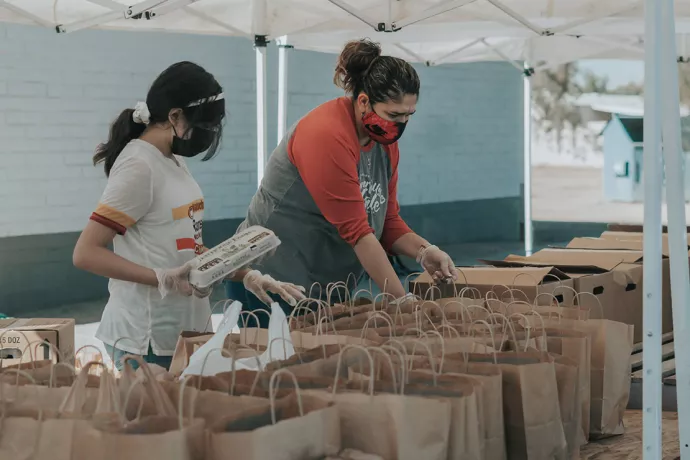
How far does a little kindness really go? UTM researcher examines how doing good safeguards mental well-being
Throughout human history, most belief systems have espoused kindness as an important value.
The Old Testament encourages to “love your neighbour as yourself,” while “be kind and compassionate to one another” and “love your enemies” are exhorted in the New Testament. Buddhism encourages practicing “metta” or loving-kindness towards all beings.
We intuitively know kindness can alleviate the suffering of others, plus engender virtuous satisfaction in the giver. Now, the benefits of kindness are starting to be confirmed by hard facts, thanks to new research being conducted at U of T Mississauga.
Sociology associate professor Andrew Miles is exploring how our mental and emotional well-being during the pandemic can be safeguarded by prosocial behaviour, which are acts focused on the welfare of others. At a time when heightened fear, uncertainty, isolation and economic hardship are causing greater anxiety and depression, Miles says, we should better understand the healing effects of kindness.
“If there’s anything we can contribute to help people remain emotionally stable during the pandemic and stave off some degree of the mental health challenges—that is the imperative behind this study,” says Miles, principal investigator of UTM’s Morality, Action and Cognition Lab.
For this ongoing research, Miles is collaborating with Meena Andiappan, assistant professor at U of T’s Institute of Health Policy, Management and Evaluation; sociology professor Laura Upenieks at Baylor University in Texas; and UTM sociology student Christos Orfanidis. The study received $57,393 from U of T’s Toronto COVID-19 Action Fund, which directed nearly $9 million to 30 faculty research projects contributing to the global fight against the novel coronavirus.
About 1,000 participants recruited online from Canada and the U.S. are being randomly assigned to perform either prosocial, self-focused or neutral behaviours three days a week for three weeks. Among the prosocial acts reported to researchers so far: volunteering to deliver food to the elderly; donating money to Doctors without Borders; spreading sand on an icy sidewalk; helping a couple carry their groceries; and pushing a stranger’s car out of the snow.
Five weeks after the start of the intervention, the participants are being more extensively surveyed to determine the effects of these behaviours on their emotional well-being—how happy they perceive themselves to be, whether they believe their life is valuable; and their mental health, specifically anxiety and depression.
Miles says the study builds on the growing positive psychology movement, which is concerned with understanding what makes life most worth living, both at the individual and societal levels. Rooted in millennia-old religious and philosophical discourses, it only became a formal discipline about two decades ago.
“In some respects, the scientific world is catching up with things that have been long recognized or taught in philosophies, so this is not a new idea, but it’s starting to be given scholarly attention,” Miles says.
The discipline’s scientific literature includes few insights on whether the positive impacts of kindness endure over the long term, Miles continues. During these challenging times, with the ongoing pandemic once again threatening our upcoming holiday season, it’s worth knowing if a little kindness really does go a long way.
“We know that when we do nice things for others, it makes us feel good, it uplifts our emotions, and it has us feeling like we’re a better person,” Miles says. “We want to see if these effects are short term blips, or have lasting benefits.”
